Steve and Chris Wheatcroft – father and son Mountain Leaders
Father and son Steve and Chris Wheatcroft have recently qualified as Mountain Leaders, doing the training and passing the assessment together in July 2022, thereby becoming the first father and son team to do so. Steve is the Group Treasurer for the BBC and lives near London and Chris is a doctor living in Northumberland. Nicola caught up with them to find out more about the challenges of getting qualified when you don’t live near the mountains and the joys of staring at Welsh bogs.
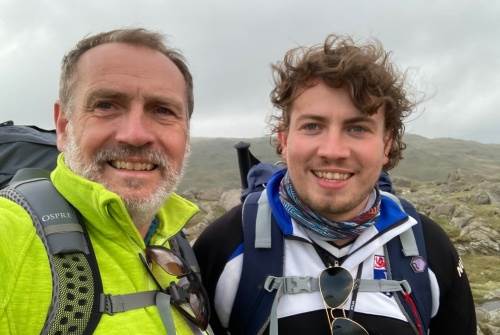
How long have you been walking in the mountains?
Steve: I was born and brought up in Lancashire, which is closer to mountainous areas than where I am now in St Albans. I've been used to being out in Scotland, North Wales and the Lakes from a very early age as my mum (Joy) had a huge appreciation for the aesthetic in nature. So we always used to go to those sorts of places when I was young but my family were not mountain walkers so I used to look around and think how utterly awesome it looked up in the mountains and how exciting it would be to be up there in that world? As a result I started doing some climbs on my own while on family holidays and loved it. I then really started walking in earnest when I moved to London for university and realised what I'd left behind. That's when I became much more passionate about the outdoor environment and the mountains. So I’ve really spent the best part of 40 years being out and about in the mountains.
Chris: I’ve been walking since a very early age and one of those pictures [image below] is when I was four going up Snowdon for the first time. It has always been a significant part of my life with the first fifteen years being family holidays and with my dad, my brother (Jonathan) and my Uncle (David) among others.
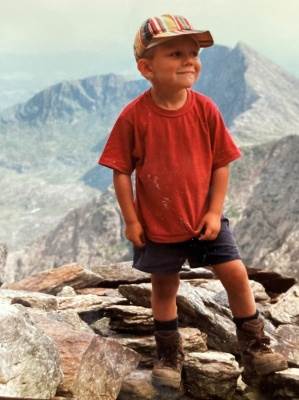 Steve
Steve: We used to do quite a lot of wild camping, with my brother, high in the mountains of Snowdonia and the Lakes when the boys were young. It used to be quite an effort for my brother and I carrying all the gear for the four of us. We also used to go mountain walking on family holidays; the picture below is my wife (Barbie) and Chris and Jonathan on the way up Snowdon when Chris was four. That trip we did Y Garn the next day and then Pen Yr Ole Wen on the third, with Barbie and I sharing carrying Susannah who was about 12 months old at that time as well as all the gear. Chris would still be full of energy each evening. Mountain walking was a regular family activity as the children were growing up.
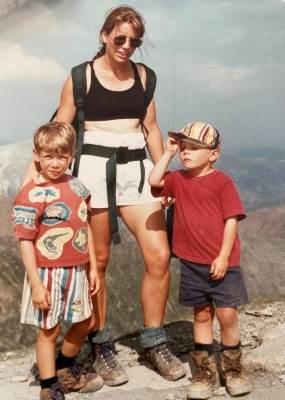 Chris
Chris: More recently with living up here, I get over to the Lakes when I can or up into the Cheviots or Simonside and in the last couple of years we've been over to Snowdonia five or six times, for about a week at a time, and also up to the Cairngorms. When I lived in New Zealand for a year I did some walking there. I worked on Skye for a couple of months in A&E and got up in the Cuillin which was fantastic.
Is it harder to find time to go together now that you're spread across the country?
Steve: A little bit harder, yes. In the last couple of years I’ve spent an awful lot of time with Chris because we've been consolidating ready for the Mountain Leader assessment. I took my daughters Susannah and Libby, who are now in their twenties, on a Snowdon horseshoe trip last year, which was a brilliant time together. Jonathan and I have done stuff over the last few years including an ascent of Kilimanjaro and some stuff in the Swiss Alps with Chris, including a traverse of the glacial Vallee Blanche and the Aiguille du Midi arete. So, while we get less chance to all be out together, it is still very special having those times with different family members on different occasions.
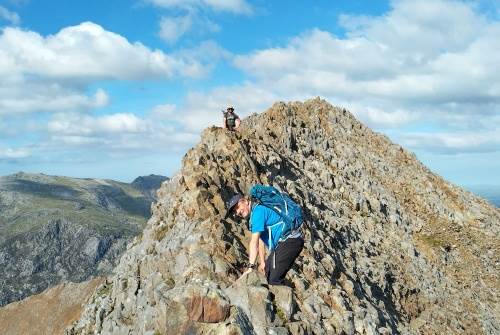
Where did the interest in becoming qualified Mountain Leaders come from? Is it something you’d talked about for a long time?
Chris: I think dad mentioned it first, whilst we were going up Pen y Fan in the January before we did our training. I was just back from New Zealand for a month, it was just before COVID. He’d been thinking about it for a while and at that stage I knew I was coming back to the UK but didn’t really know what work would look like after coming back so I decided it would be a good thing to do. So, we decided to go for it together at that stage and then haven’t looked back.
Steve: I'd spent all those decades in the mountains and done a lot of unofficial leading of different family groups and friends. I had also led a lot of self-organised charitable events as well (Welsh 3000’s, Lakeland 3000’s, three peaks…). So, I thought, I've done an awful lot here, but I'm not formally accredited, so if at some point I want to develop this further, I need to formalise things. It was partly me looking forward to retiring from my current profession at some stage and thinking, what am I going to do next? I see this as a key component in the next phase of life and for however long I'm physically fit enough to lead others in different environments. I thought it would be lovely to do it with another family member and Chris is the person who had the flex in terms of work to be able to create the time and opportunity to do it at that stage.
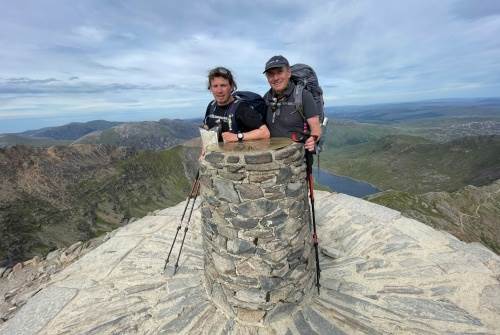
Chris, do you have any plans to use the qualification at this point or are you busy being a doctor?
Chris: I am very busy being a doctor again and am now back on a specialist training contract as of today. The idea would be to try and go part time with medical work eventually and be able to fill in Mountain Leader work around that part time schedule. I don’t know exactly when that will be, but in the interim, I’d be keen to do some weekend work, particularly as the Lakes is only a couple of hours away by car. Then there are the hills around here, which although they are smaller, are so accessible to people in Newcastle, so I might try to get people exploring these areas more.
The last time I worked in the hospital I am in now was 2018, so it’s going to be new for a while, but I’ll see how it goes after the first few weeks and try and gauge some interest in trips out among colleagues. Even if it’s not paid work, it will be rewarding just getting people out into the environment and you never know what you’re going to spark with people. It can just be that they’ve been up into the hills discovering new things about themselves, switching off and discovering a whole new world.
What did you make of the Mountain Leader training course?
Chris: The training course was really, really good. It taught us a lot of new skills to then be able to go and consolidate. Bryn was a fantastic trainer and is so approachable, knowledgeable and experienced, so I learnt huge amounts in that training week. I had done Duke of Edinburgh Gold about ten years earlier so had some reasonable map knowledge and other skills but still lots to learn.
Was that similar for you, Steve?
Steve: Yes, it was. I went into the training very open minded despite my decades of experience. I discovered quite quickly how much there was still to learn. One thing that strikes me is that most people are, to a large extent, fair weather walkers. I’ve done a certain amount of bad vis and bad weather walking over the years, but not anything like the same amount as in good weather. So, learning all the micro navigation skills, really getting to grips with map visualisation, recognition of features and contours was challenging. We just went to a totally new level in terms of navigation. So that was both fascinating and quite challenging.
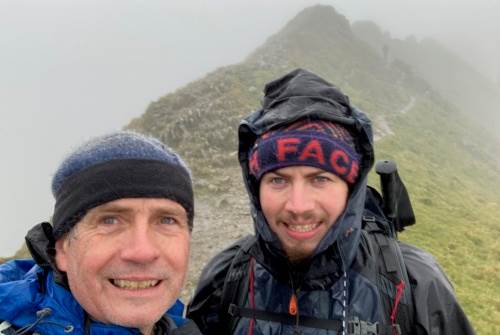
And then developing a more general appreciation of the mountain environment in its entirety. I love taking photos which I inherited from my mum. I love the wonder of nature, the majesty of the mountains. But developing a deeper knowledge of the flora of Snowdonia was very enriching and involved us walking with our heads down more than ever before and searching out bogs to find butterwort and sundew! Developing this broader interest is something both Bryn and Tom Furey* (who we did our training expedition with) really encouraged. Tom was absolutely brilliant, and communicated an extraordinary passion for all of the broader knowledge of the outdoor environment. It's a bit emotional actually talking about Tom, he brought something that was very complementary to Bryn and quite unique. So, I'd say there were quite a few surprises in terms of what I discovered through the training and a lot to go away and work on in consolidation.
Chris: They were just really good, very flexible and made you feel very comfortable and confident to be able to ask things to develop your understanding and knowledge.
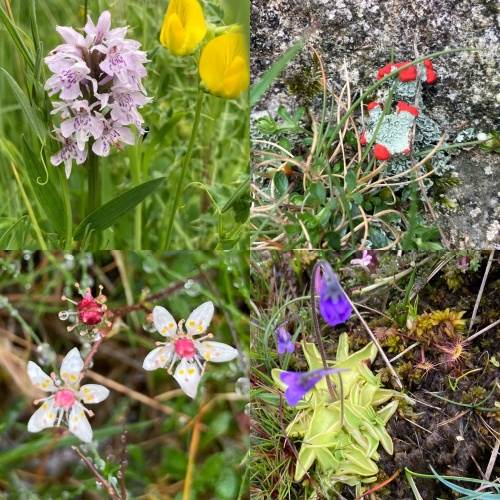 Top left: heath-spotted orchid. Top right: cladonia (devil's matchstick lichen). Bottom left: starry saxifrage. Bottom right: butterwort is the plant with the blue/purple flower and pale green foliage, sundew is just to the right - the spikey looking red/pink and yellow plant.Steve
Top left: heath-spotted orchid. Top right: cladonia (devil's matchstick lichen). Bottom left: starry saxifrage. Bottom right: butterwort is the plant with the blue/purple flower and pale green foliage, sundew is just to the right - the spikey looking red/pink and yellow plant.Steve: The training expedition we did with Tom was quite funny. He was of course the master of kit and lightweight rucksacks. When we turned up with heavy rucksacks and a lot of plastic bags rather than dry bags (when Chris and I were wild camping many years ago black bin liners and carrier bags were what you used!) I am not sure he quite knew what to make of it. So that was quite a significant moment in us thinking we definitely needed to do a bit of investment in kit and start to get ourselves organised for this century rather than last century! We now have so many dry bags between us, all colours and sizes. Another amusing thing is that we turned up to our training with the maps that I'd been using for very many years. I think one of them was from 1987 which I am using in the picture below! That gave Bryn a good laugh because of course there was no open access ground marked on there. So, I think on the first day of our training we were down at Crib Goch Outdoors, buying our new up to date maps much to Bryn’s relief!
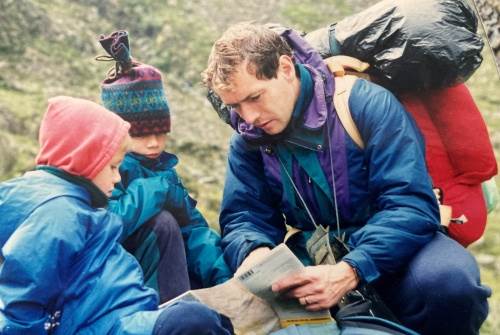 Chris
Chris: It was quite amazing in some ways how little had changed, except for the CRoW land. But I would certainly advocate having up to date maps!
Did you both have similar things that you needed to work on during the consolidation period?
Chris: I think similar overall. Consolidation on micro navigation, which is a significant part of the Mountain Leader syllabus and one of the key assessment skills. We'd done a little bit of night time stuff in the Lake District, we used to go for night hikes up a hill near a farm that we used to stay on with extended family, including my grandparents. Also getting more experience with bad weather and poor visibility. And then we did our first aid course in Llanberis and met up with someone who was doing their assessment a few weeks after. Spending time with them and seeing their impressive knowledge of flora, geology, mythology and the mountain environment more generally was impressive. So that was a bit of a kick starter to realising that we needed to know a lot more in that area. So, we spent a couple of days just looking at bogs in Cwm Idwal. It's amazing how much stuff you can find there!
Steve: I don't think we've ever spent quite so long walking, looking down at our feet spotting flowers and rocks as opposed to ahead. I think probably from my perspective, it was the navigation stuff and map work, including feature recognition, that I took away as the skills I really needed to get to grips with. So that was where I put most effort.
In addition, consolidating the rope work was important. We were very used to steep ground because we'd done a lot of scrambling from when Chris was very young and I've been scrambling for a long time, but emergency rope work was not something that we were particularly familiar with and we're not rock climbers. Also as Chris says, that whole piece around the broader interest also. So very similar objectives.
I think we did probably close to 30 QMD's in the consolidation period, of which 28 we did together. It wasn't hard to structure them so that we were both hitting our objectives and we had wonderful times out including with some other extended family members at times which was great.
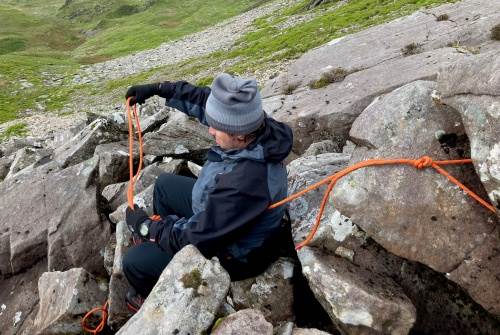
When you finished the training, did you think ahead to the timing of your assessment or did you just wait to see when you thought you were ready?
Steve: We waited, because when we did the training it was October of COVID year, which was 2020. So, there wasn't immediate visibility over how quickly we would be able to do the necessary consolidation and when we'd be able to sensibly travel and have decent access to the hills. We hadn't quite done what we needed to do when we booked onto the final assessment. And inevitably having a deadline just spurs you on to ensure you are finally and fully prepared. So, I think we booked maybe February/March time this year and initially were supposed to be doing it in June starting just after Tom has his tragic accident. So that was obviously cancelled. We still remember Tom a lot when we are out and about seeing some of the things he spoke about and doing some of the things he taught us. We were fortunate to manage to reschedule for July which was good as it gave us a chance to complete the assessment and hence the whole accreditation journey together before Chris started back working full time as a doctor.
Was it nice to have the other one there with you on the assessment? To have somebody there that knows you and is also experiencing the same thing?
Chris: Yeah, it was nice. It was slightly strange, just in the context of it being an assessment. There were three of us being assessed and we obviously didn't want it to feel like the third person (Anna) was there on her own. So we tried to be as friendly and open as we could and maintain a healthy distance between ourselves (except when sharing a small two man tent!). Also, just by the nature of it being an assessment we didn't want to be helping each other in terms of the skills and knowledge (not that Bryn would have allowed that!) but it was nice to have the knowledge of us routing for each other and Anna too – we had a brilliant time together all four – I hope we can include Bryn in that!
Were you pretty nervous going into the assessment week or did you feel like you were ready?
Chris: I felt pretty ready. I think probably on the first morning just slightly nervous, but Bryn was very good at giving you lots of opportunities to demonstrate your skills. He created a comfortable environment for us to display our knowledge and skills rather than feeling like we were constantly being watched and under pressure. I don't think we could have asked for better in terms of an assessment week.
Steve: I think I had a healthy edge of nerves because, you're thinking, this is quite a big deal actually and you want to be successful with a high standard to be met. So, whilst feeling well prepared, I wasn't taking it for granted and when Bryn communicated the good news of us all having passed, there was certainly a sense of relief for me. But the week was actually brilliant fun – the best of times. But within it there were moments of intensity where you're thinking, ‘I've got to find that small crag. Right. Okay, that's going to be a little bit of a challenge.’ And there's always that moment of extraordinary relief when you point at your map with a little bit of grass and Bryn says yes you are in exactly the right place having also given your reasons as to why you think that is the case. I would never have believed pointing at a map with a piece of grass could be so nerve wracking! The whole experience is unique in so many ways isn't it? It's a special experience.
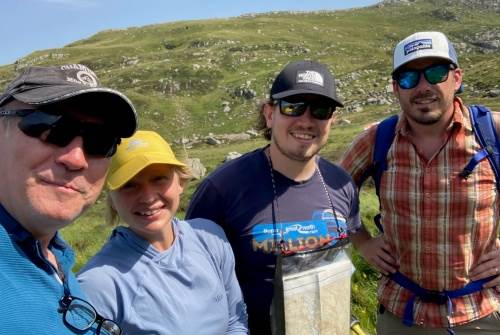 From left to right: Steve, Anna, Chris and Bryn during the assessment.
From left to right: Steve, Anna, Chris and Bryn during the assessment.Is there anything that you wish you’d known or any advice that might have helped you along the way?
Steve: I’d say to people, definitely take and use the consolidation period. Don’t rush to assessment. I think we paced it well. Rushing it would be ill-advised because it’s not just about getting the accreditation, it's about doing that in a high quality way. Also get up to date maps and be prepared to develop an enquiring mind.
Chris: Having that really solid foundation in the basic skills, knowing what you can fall back on when needed. If you get a bit stuck you can always retrace your steps to a known location. There are certain things you can always rely on. Getting it as second nature so when it’s pitch black or the mist is in, you know you can always fall back on those key principles of knowing which way slopes are going, knowing how to pace, knowing exactly where you’ve come from. Getting as much confidence and having it as a reflex to be able to fall back on.
What are your walking plans for the future?
Steve: Now I’ve got the accreditation, it’s a case of working out exactly how I want to use it over the next few years. There are two things that are important to me; one is helping other people to discover the beauty, the wonder, the delight that is there in the mountainous environment and just share that experience and passion. The other thing, which is allied to that, is helping people to fulfil and realise their potential, which is different for different people. I’m drawn to doing stuff in the charitable environment because I think often there you are working with people for whom things, that are relatively straightforward for Chris and I, are a massive challenge. I think the challenge and reward of that kind of work would be very satisfying.
I’m also keen to think around educational work with young people through the Duke of Edinburgh’s Award. Being able to help in fostering that love of and competence in this sort of environment. The way I see it at the moment is like a canvas with a couple of broad brush strokes on it, and the excitement of the next year is to see how the detail starts to fill out – it’s very exciting. Despite the constraints that Chris has, it would also be amazing if we could do a few bits together, as a team we are a unique proposition and we work really well together.
Chris: In terms of specific trips, I’ve not got anything planned. I’d like to go back to Skye, potentially in the next twelve months if time allows and spend more time up in the Black Cuillin because it’s such a unique environment in the UK. It’s a long way but it’s still very accessible. In terms of stuff with other people I’d like to try to go up into the hills with people from a hospital environment who maybe haven’t experienced it before or aren’t confident in that environment. To provide a bit of a release after lots of us have had a very strained and intense couple of years.
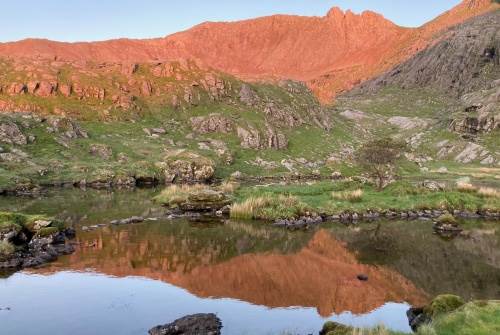
* Tom Furey, who worked on Steve and Chris's Mountain Leader training died on Saturday 11 June 2022 whilst
scrambling in North Wales.